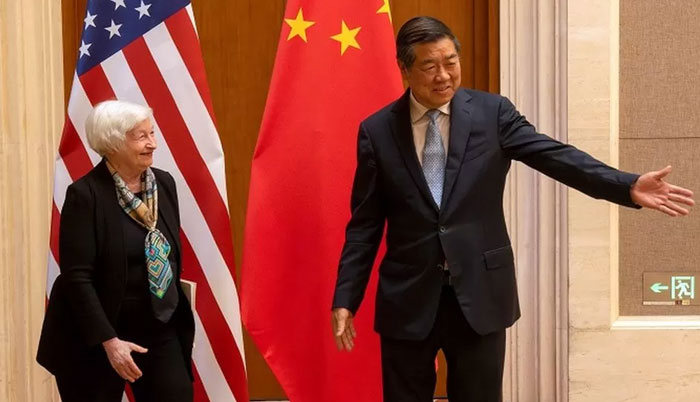![]() Home > Asia
Home > Asia
Has Janet Yellen's Trip To Beijing Improved US-China Relations?

REUTERS | China's He Lifeng welcomes Janet Yellen during a meeting in Beijing
![]() July 10th, 2023 | 11:14 AM |
July 10th, 2023 | 11:14 AM | ![]() 470 views
470 views
CHINA - US
US Treasury Secretary Janet Yellen has just concluded a four-day trip to China, aimed at rebuilding bridges between the two countries.
Was the trip to Beijing a success? Well, by one very basic metric, yes.
The US and China are once again talking to each other, face to face, politely and respectfully, if not warmly.
It's a stark contrast to trans-Pacific communication during the Donald Trump administration, which was done largely via the megaphone of social media.
The tone and the content from both sides is more positive and more measured. Ms Yellen's trip follows US Secretary of State Antony Blinken's high-stakes visit in June, where both countries pledged to stabilise relations.
At the end of her trip on Sunday, Ms Yellen said it would help to build a "resilient and productive channel of communication with China's new economic team". That should not be discounted.
In March this year, much of the top tier of China's government was replaced with men whose primary qualification is loyalty to leader Xi Jinping. Key among them is the country's new economic chief, He Lifeng.
On Saturday Janet Yellen spent much of the day with Mr He. She said their talks had been "direct, substantive and productive", while admitting that the two sides had "significant disagreements".
Throughout her visit Ms Yellen sought to persuade her Chinese hosts that under President Joe Biden, America is not fundamentally hostile to China.
"We do not see our relationship in terms of great power conflict", she said, and "we do not seek to decouple" our economies from each other.
It appears the Biden administration is trying to demonstrate that its China policy is not simply a continuation of the Trump administration's open hostility to Beijing. Did she succeed? We are still waiting to hear from the Chinese side.
But as the saying goes, actions speak louder than words. And from Beijing's perspective, some recent actions of the Biden administration are anything but friendly.
Key among them is the imposition of export controls on certain US microchips that are used in the development of artificial intelligence.
Far from being eased, the US is now moving to widen those restrictions to other high-tech exports to China, while leaning hard on its allies, from Japan to Germany, to the Netherlands, not to supply China with the means to make the most cutting-edge microchips.
America's motivation is simple: It doesn't want China to have easy access to American technologies that could give it an edge in things like AI, and in military technologies that could one day be used against the US in a future conflict over, for example, Taiwan.
All of this means that while dialogue has re-opened, and looks set to accelerate in the coming months, the process is delicate.
Progress made in the last few days could very easily be knocked back by another "spy balloon" incident, or a close call between US and Chinese naval ships or aircraft.
Even the most optimistic experts believe this is now a very difficult relationship that will require careful, long-term management by both sides in order to keep it stable.
Source:
courtesy of BBC NEWS
by Rupert Wingfield-Hayes | BBC Asia correspondent
If you have any stories or news that you would like to share with the global online community, please feel free to share it with us by contacting us directly at [email protected]